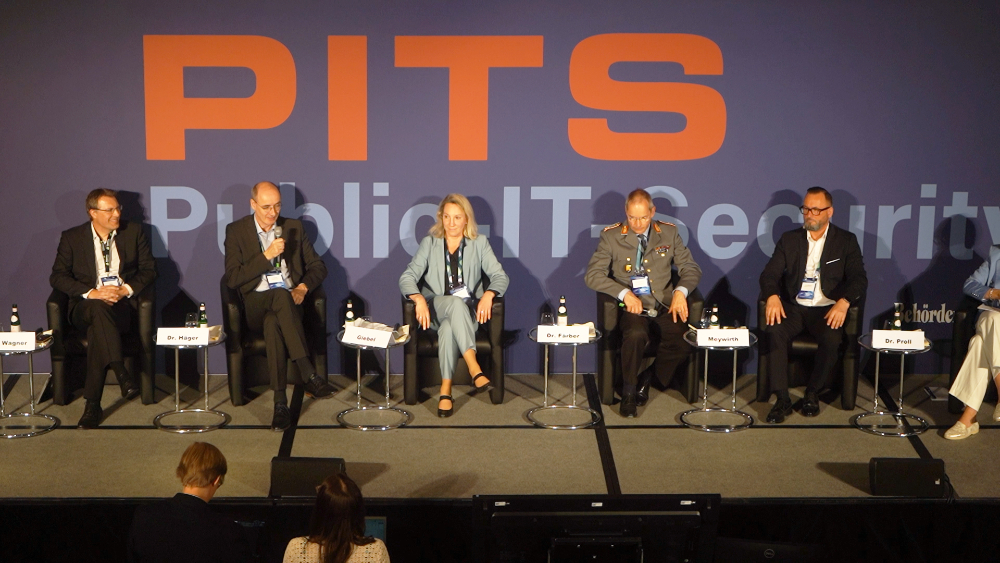“Security crises are like earthquakes” – Greenbone CEO Jan-Oliver Wagner at the PITS Congress 2024
“Support for early crisis detection” was the topic of a high-profile panel on the second day of this year’s PITS Congress. On stage: Greenbone CEO Jan-Oliver Wagner together with other experts from the Federal Criminal Police Office, the German Armed Forces, the Association of Municipal IT Service Providers VITAKO and the Federal Office for Information Security.

Once again this year, Behörden Spiegel organized its popular conference on Public IT Security (PITS). Hundreds of security experts gathered at the renowned Hotel Adlon in Berlin for two days of forums, presentations and an exhibition of IT security companies. In 2024, the motto of the event was “Security Performance Management” – and so it was only natural that Greenbone, as a leading provider of vulnerability management, was also invited (as in 2023), for example in the panel on early crisis detection, which Greenbone CEO Dr. Jan-Oliver Wagner opened with a keynote speech.
In his presentation, Jan-Oliver Wagner explained his view on strategic crisis detection, talking about the typical “earthquakes” and the two most important components: Knowing where vulnerabilities are, and providing technologies to address them.
Greenbone has built up this expertise over many years, also making it vailable to the public, in open source, always working together with important players on the market. For example, contacts with the German Federal Office for Information Security (BSI) were there right from the start: “The BSI already had the topic of vulnerability management on its radar when IT security was still limited to firewalls and antiviruses,” Wagner is praising the BSI, the German government’s central authority for IT security.
Today, the importance of two factors is clear: “Every organization must know how and where it is vulnerable, know its own response capabilities and has to keep working on improving them continuously. Cyber threats are like earthquakes. We can’t prevent them, we can only prepare for them and respond to them in the best possible way.”
“A crisis has often happened long before the news break”
According to Jan-Oliver Wagner’s definition, the constant cyber threat evolves into a veritable “crisis” when, for example, a threat “hits a society, economy or nation where many organizations have a lot of vulnerabilities and a low ability to react quickly. Speed is very important. You have to be faster than the attack happens.” The other participants on the panel also addressed this and used the term “getting ahead of the wave”.
The crisis is often already there long before it is mentioned in the news, individual organizations need to protect themselves and prepare themselves so that they can react to unknown situations on a daily basis. “A cyber nation supports organizations and the nation by providing the means to achieve this state,” says Jan-Oliver Wagner.
Differences between the military and local authorities
Major General Dr Michael Färber, Head of Planning and Digitalization, Cyber & Information Space Command, explained the Bundeswehr’s perspective: According to him, a crisis occurs when the measures and options for responding are no longer sufficient. “Then something develops into a crisis.”
From the perspective of small cities and similar local authorities, however, the picture is different, according to Katrin Giebel, Head of VITAKO, the Federal Association of Municipal IT Service Providers. “80 percent of administrative services take place at the municipal level. Riots would already occur when the vehicle registration is not available.” Cities and municipalities keep being hit hard by cyber attacks, and crises start much earlier here: “For us, threats are almost the same as a crisis.”
Massive negligence in organizations is frightening, says BSI
The BSI, on the other hand, defines a “crisis” as when an individual organization is unable or no longer able to solve a problem on its own. Dr Dirk Häger, Head of the Operational Cyber Security Department at the BSI: “As soon as two departments are affected, the crisis team convenes. For us, a crisis exists as soon as we cannot solve a problem with the standard organization.” This is giving a crucial role to those employees who decide whether to call together a meeting or not. “You just reach a point where you agree: now we need the crisis team.”
Something that Häger finds very frightening, however, is how long successful attacks continue to take place after crises have actually already been resolved, for example in view of the events surrounding the Log4j vulnerability. “We put a lot of effort into this, especially at the beginning. The Log4j crisis was over, but many organizations were still vulnerable and had inadequate response capabilities. But nobody investigates it anymore,” complains the head of department from the BSI.
How to increase the speed of response?
Asked by moderator Dr. Eva-Charlotte Proll, editor-in-chief and publisher at Behörden Spiegel, what would help in view of these insights, he describes the typical procedure and decision-making process in the current, exemplary checkpoint incident: “Whether something is a crisis or not is expert knowledge. In this case, it was a flaw that was initiated and exploited by state actors.” Action was needed at the latest when the checkpoint backdoor was beginning to be exploited by other (non-state) attackers. Knowledge of this specific threat situation is also of key importance for those affected.
Also Jan Oliver Wagner once again emphasized the importance of the knowledge factor. Often the threat situation is not being discussed appropriately. At the beginning of 2024, for example, an important US authority (NIST) reduced the amount of information in its vulnerability database – a critical situation for every vulnerability management provider and their customers. Furthermore, the fact that NIST is still not defined as a critical infrastructure shows that action is needed.
The information provided by NIST is central to the National Cyber Defense Center’s ability to create a situational picture as well, agrees Färber. This also applies to cooperation with the industry: several large companies “boast that they can deliver exploit lists to their customers within five minutes. We can improve on that, too.”
Carsten Meywirth, Head of Department at the BKA, emphasized the differences between state and criminal attacks, also using the example of the supply chain attack on Solarwinds. Criminal attackers often have little interest in causing a crisis because too much media attention might jeopardize their potential financial returns. And security authorities need to stay ahead of the wave – which requires intelligence and the potential to disrupt the attackers’ infrastructure.
BKA: International cooperation
According to Major General Färber, Germany is always among the top 4 countries in terms of attacks. The USA is always in first place, but states like Germany end up in the attackers’ dragnets so massively simply because of their economy’s size. This is what makes outstanding international cooperation in investigating and hunting down perpetrators so important. “Especially the cooperation of Germany, the USA and the Netherlands is indeed very successful, but the data sprints with the Five Eyes countries (USA, UK, Australia, Canada and New Zealand) are also of fundamental importance, because that is where intelligence findings come to the table, are being shared and compared. “Successful identification of perpetrators is usually impossible without such alliances,” says Michael Färber. But Germany is well positioned with its relevant organizations: “We have significantly greater redundancy than others, and that is a major asset in this fight.” In the exemplary “Operation Endgame“, a cooperation between the security authorities and the private sector launched by the FBI, the full power of these structures is now becoming apparent. “We must and will continue to expand this.”
“We need an emergency number for local authorities in IT crises”
Getting ahead of the situation like this is still a dream of the future for the municipalities. They are heavily reliant on inter-federal support and a culture of cooperation in general. An up-to-date picture of the situation is “absolutely important” for them, Katrin Giebel from VITAKO reports. As a representative of the municipal IT service providers, she is very familiar with many critical situations and the needs of the municipalities – from staff shortages to a lack of expertise or an emergency number for IT crises that is still missing today. Such a hotline would not only be helpful, but it would also correspond to the definition from Wagner’s introductory presentation: “A cyber nation protects itself by helping companies to protect themselves.”
BSI: prevention is the most important thing
Even if the BSI does not see itself in a position to fulfil such a requirement on its own, this decentralized way of thinking has always been internalized. But whether the BSI should be developed into a central office in this sense is something that needs to be discussed first, explains Dirk Häger from the BSI. “But prevention is much more important. Anyone who puts an unsecured system online today will quickly be hacked. The threat is there. We must be able to fend it off. And that is exactly what prevention is.”
Wagner adds that information is key to this. And distributing information is definitely a task for the state, which is where he sees the existing organizations in the perfect role.

Markus Feilner is a consultant for IT security, digital sovereignty and open source strategies from Regensburg. He has been working with Linux since 1994. He has been writing studies, articles and blog posts for Greenbone since 2021.



